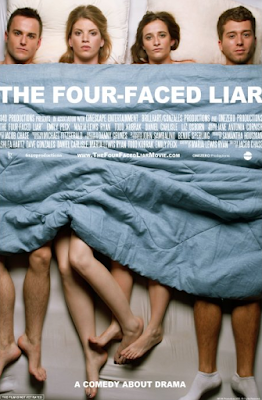The Gist:
Bob, a large sized man who is having a not so great day, meets handsome chef Andy and they make a connection, but will the potential new relationship survive Bob's insecurities, wacky mother, fabulous friends and handsome enemies?
Comments (with unimportant spoilers):
In the movie we have high maintenance Bob, a quipster with low self esteem, unlucky in love but successful in his business as a party planner. A bit of a surprise as the two examples of his work we get to see both consist of nearly empty rooms we are told are large successful events. Ignoring this and returning focus to Bob, he has a circle of fabulous gay friends who while not overly concerned about helping Bob find love, at the very least want to get him laid.
The immediate obstacle to this is that Bob is fat, the absolute worst thing possible in vain, looks obsessed Los Angeles. So one of the many, many stereotypes in the movie is the overused and tired trope of all Angelenos being looks obsessed. Which is not to say that large people don't have issues to deal with, it's just that Bob isn't the huge obese slob the movie pretends he is, in the real world he's "merely" a chubby dude, and in the real world there are many gay dudes who are into heavier men, even in vain looks-ist L.A.
But that's real world, while this is a movie where being called a bear is an insult, so okay, Bob has a huge problem. Except that the problem is quickly thrown away once he meets Andy, who instantly falls for Bob. Moving us to the next problem, Bob's low self esteem.
The movie presents his insecurities as threats to the new relationship. Understandable and a workable story for a movie. Bob's irrational fears lead to him making mistakes and lashing out against his friends and Andy.
This is spoiler territory now, but after making the argument that Bob is his own worst enemy when it comes to love, the movie then immediately sets out to weaken it by showing that Bob's fears aren't unfounded.
His fabulous friends suddenly switch for absolutely no reason from being supportive (if shallow) to 'mean bitches' actively working against him. They end getting "punished" for this arbitrary change. There's also Bob's "enemy," an attractive man who for dull reasons doesn't like Bob and in return Bob doesn't like him. As a result of Bob's insecurity shenanigans, enemy boy becomes an almost interesting three dimensional character for a few minutes before settling back down to merely being a boring generic jerk.
His fabulous friends suddenly switch for absolutely no reason from being supportive (if shallow) to 'mean bitches' actively working against him. They end getting "punished" for this arbitrary change. There's also Bob's "enemy," an attractive man who for dull reasons doesn't like Bob and in return Bob doesn't like him. As a result of Bob's insecurity shenanigans, enemy boy becomes an almost interesting three dimensional character for a few minutes before settling back down to merely being a boring generic jerk.
It is as if for whatever reason a decision was made that low self esteem isn't exciting enough to move the story forward so there was a need to force in even more drama. Because somehow high drama Bob's antics were not enough? Thing is, the movie would have been far more interesting had Bob been forced to deal with how his issues affected all of his relationships, not just with handsome chef Andy, but with his friends (had they not been turned into cartoon villains) and family, but I'm now in how I would have rewritten the movie territory which is generally not a good sign.
It sounds like I hated the movie though I didn't. I thought it was an average indie flick. Admittedly a large part of my not disliking it may be due to my having a 'thing' for Nicholas Brendon who plays love interest Andy.
Women:
Yes
Yes
People of color:
Yes
Yes
- Director: Ringo Le
- Writer: Ringo Le
- Actors: Jonathan Lisecki, Nicholas Brendon, Ann Walker
- 85 min
- IMDB







































